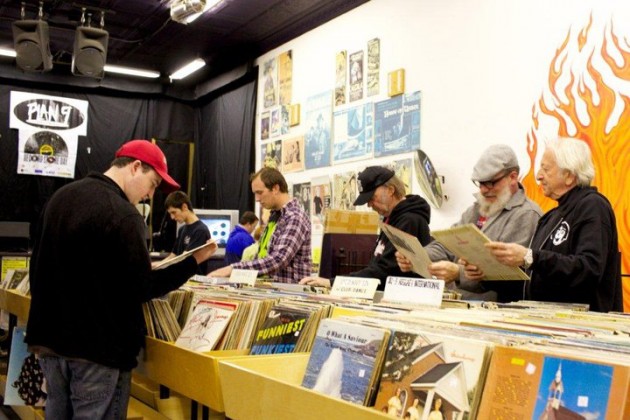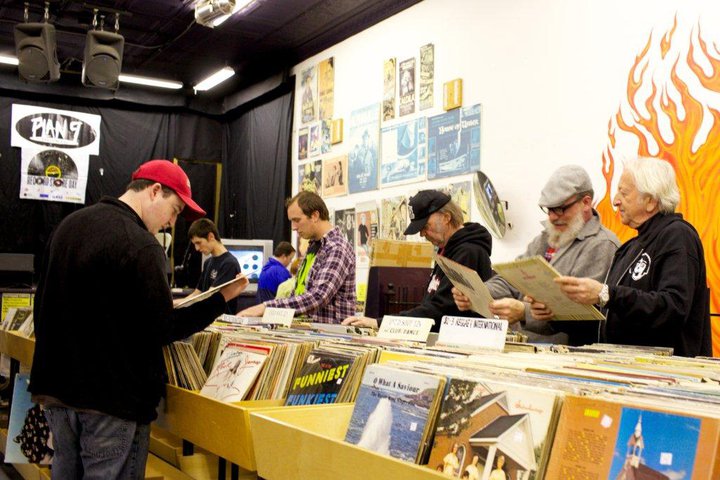
Way back on August 4, Pitchfork’s Ryan Schreiber posted consecutive tweets that have since latched themselves onto the back of my brain. The fuse has been lit and simmering for more than two months. An artist – at this point I can’t even remember who – had just released a new song on their website that could be downloaded in exchange for an e-mail address, a fairly common practice nowadays. Schreiber then launched the only two tweets I have listed as “favorites”:
[blackbirdpie url=http://twitter.com/#!/ryanpitchfork/status/99311737324580866]
[blackbirdpie url=http://twitter.com/#!/ryanpitchfork/status/99318311245971457]
Before I delve into exactly what’s been slowly eating away at my sanity, a big, bold disclaimer must be inserted here. My incensed overreaction to Schreiber’s tweets generally have nothing to do with his association with Pitchfork – more on the necessity for the word “generally” in a moment. In fact, as a music writer, I look to Schreiber’s accomplishments as a source of inspiration. He’s been able to take his passion and turn it into a profession and I think any music blogger who tells you they aren’t inspired at least a little bit by what he’s done are lying to you and probably to themselves.
I should also state that I really hope no one is out there holding a candle to my own tweets and the stupid, possibly drunken opinions therein. Twitter is a great medium, but let’s be honest: it facilitates an awful lot of knee-jerk reactions and flimsy opinions. We’ve all posted something ill-conceived. Regardless, whether or not Pitchfork’s founder had really thought his opinion through or spewed it out after a few whiskey shots, that’s not the point. His tweets are merely a catalyst, another drop in the near-full bucket that keeps feeding my curiosity about the relationship between fan and music in terms of business and, as it were, marketing.
My initial reaction to Schreiber’s first tweet, that asking for an e-mail address or some sort of social media connection in exchange for an MP3 download of a new song is somehow invasive, was one of outrage. That it was coming from Ryan Schreiber’s keyboard didn’t even register at first. As soon as that clicked, my ire changed courses before eventually getting back to its origin. As Schreiber himself has stated on many occasions, he founded Pitchfork primarily because it was a means to obtain free music. You can Google it and, as we all know, Google never lies. As I focused on the source of the comment, I couldn’t help but go from angry to, frankly, a little offended. If Schreiber’s stated ambition was to gain free music, well, someone get the man a “mission accomplished” banner. He’s swimming in free promotional schwag and we all know it. So then, tell me, why is having to enter an e-mail address to get another free song such a burden? As the founder of a dominant independent music webzine, is his e-mail account not already attached to mailing lists for press releases? What’s the beef?
And so I arrived back at my original thought, a thought manifest as a question: how entitled have music fans become? Remember, this isn’t about Ryan Schreiber. This is about all of us: the people who post 200 word complaints when a music festival books an act that you are in no way obligated to see, the ones who complain about having to click that like button on Facebook to hear a song when you can just as easily block updates from that page, and the ones who shout catcalls at performers during live shows beckoning their own ideal setlist.
On any given morning, my e-mail is flooded with solicitations from companies whom I bought a product from once five years ago, invitations for threesomes from sexy single women in my area, and the occasional offer from some charitable foreign royal to politely deposit a few million bucks in my bank account. If spam were a currency, Occupy Wall Street would be picketing outside my apartment. And that’s the crux of my fervor: if an artist offers up a song for free – meaning no exchange of legal tender – and wants my e-mail address in return, how is this invasive? From the sidebar on my Facebook account to the targeted Google adsense ads all over the web, I’m already being targeted by more marketing than my feeble mind can comprehend. We all are. Is it such a big deal to get one more e-mail here and there from an artist that, presumably, I enjoy? No, it isn’t.
Music pirates have tons of excuses as to why they don’t buy music and what might change their behavior. And Schreiber’s second tweet is spot on. If people who download the song enjoy it, of course they’ll want to hear the rest of the album. Of course there should be a pre-order link. But that certainly doesn’t mean fans will use it. And so labels and artists effectively barter their songs for advertising; if you join their e-mail list they can market directly to you, their known fan, while if they get you to click like on their Facebook page they can fish for prospective new fans (and hopefully customers) from your friends list as your news feed shares with everyone that you’ve done so.
But frankly, that has nothing to do with the question of entitlement. Every single week we’re bombarded with album streams prior to release dates. Some artists let fans pay whatever they want for their music. Some give it a way for free. Still others sell complete memorabilia packages, effectively charging a little bit more but incentivizing the sale of the actual music with a t-shirt or poster. I got two free copies of Watch the Throne because I purchased a pair of concert tickets. An e-mail address for a song hardly seems unreasonable. Have we really reached the point where even free is too expensive? Are we so conditioned to getting what we want, when we want, how we want — instantly, no less — that we’ve lost our sense of gratitude and empathy?
There’s a belief that music is an art form, that it’s a child of passion and love. All of which is true. But there’s also a belief that artists should be churning out material regardless of whether or not it’s being traded in exchange for currency – which is, if we’re being honest, happening to every artist on the planet every single day in some form or another anyway. That belief is incorrect. Musicians that start recording out of their bedrooms or garages have jobs too, you know. When a blog catches wind of their tracks and they suddenly gain notoriety, they usually keep up the day job. How else would they function if their music isn’t generating revenue? These days, unless you’ve really struck it big, being a musician isn’t as lucrative as fans tend to think. The art itself is natural, it is a product of passion and love. The key word there though, at least eventually, is product.
There’s always a breaking point, a moment in time where business becomes something that absolutely has to be considered and addressed. That doesn’t change the level of heart that goes into it, but it certainly – and strangely – changes the perception of those who soak the stuff up. Sometimes that perception distorts so much that it makes us do crazy things, like fuss about having to join a mailing list that can be unsubscribed from at the click of a button, subscribe to a Facebook page that can be unliked in a snap, or retweet a message that will eventually be lost in the ether anyway – unless, of course, it clings to my memory and eventually reaches a breaking point of its own.
John Lennon once said that “music is everybody’s possession,” a succinct and beautiful proclamation that seems especially relevant. The music our favorite artists churn out – the very best of it, at least – comes from a place of love, of spirit. But it is up to us as fans to remain aware of the other things involved in the craft, the enormity of the work and the business aspects that, for better or worse, do enter the equation. It is up to us to remain appreciative of the gifts we’re afforded, even if it comes at the cost of sharing an e-mail address.

